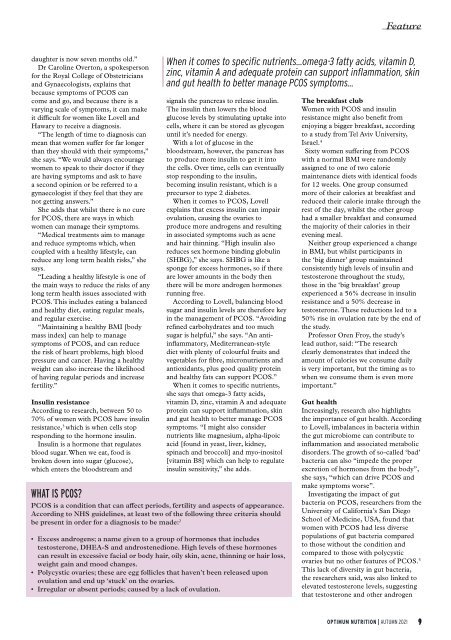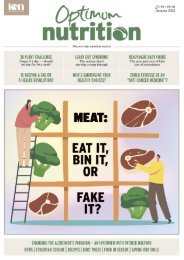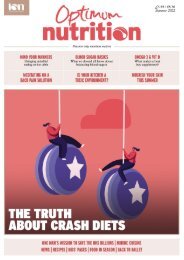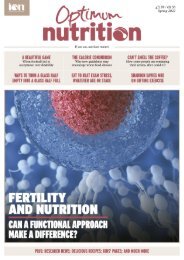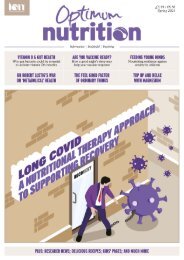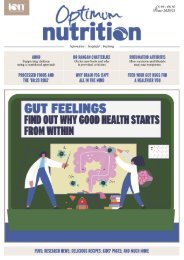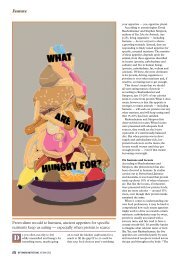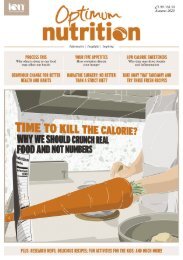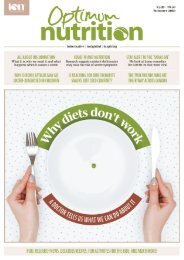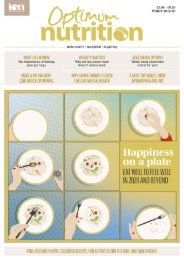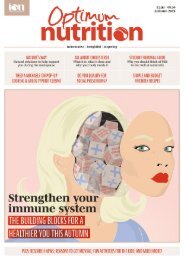Optimum Nutrition - Autumn 2021 - PREVIEW
A nutritional therapy approach to polycystic ovary syndrome (PCOS) | Community chef Sanjay Kumar on slow food, and how he’s working to eradicate food poverty | Recipes from the Ottolenghi Test Kitchen | A fresh look at the hygiene hypothesis | Food additives: is there a price for pretty products? | Your ultimate winter survival kit | Plus kids pages, research updates and more!
A nutritional therapy approach to polycystic ovary syndrome (PCOS) | Community chef Sanjay Kumar on slow food, and how he’s working to eradicate food poverty | Recipes from the Ottolenghi Test Kitchen | A fresh look at the hygiene hypothesis | Food additives: is there a price for pretty products? | Your ultimate winter survival kit | Plus kids pages, research updates and more!
- No tags were found...
Create successful ePaper yourself
Turn your PDF publications into a flip-book with our unique Google optimized e-Paper software.
Feature<br />
daughter is now seven months old.”<br />
Dr Caroline Overton, a spokesperson<br />
for the Royal College of Obstetricians<br />
and Gynaecologists, explains that<br />
because symptoms of PCOS can<br />
come and go, and because there is a<br />
varying scale of symptoms, it can make<br />
it difficult for women like Lovell and<br />
Hawary to receive a diagnosis.<br />
“The length of time to diagnosis can<br />
mean that women suffer for far longer<br />
than they should with their symptoms,”<br />
she says. “We would always encourage<br />
women to speak to their doctor if they<br />
are having symptoms and ask to have<br />
a second opinion or be referred to a<br />
gynaecologist if they feel that they are<br />
not getting answers.”<br />
She adds that whilst there is no cure<br />
for PCOS, there are ways in which<br />
women can manage their symptoms.<br />
“Medical treatments aim to manage<br />
and reduce symptoms which, when<br />
coupled with a healthy lifestyle, can<br />
reduce any long term health risks,” she<br />
says.<br />
“Leading a healthy lifestyle is one of<br />
the main ways to reduce the risks of any<br />
long term health issues associated with<br />
PCOS. This includes eating a balanced<br />
and healthy diet, eating regular meals,<br />
and regular exercise.<br />
“Maintaining a healthy BMI [body<br />
mass index] can help to manage<br />
symptoms of PCOS, and can reduce<br />
the risk of heart problems, high blood<br />
pressure and cancer. Having a healthy<br />
weight can also increase the likelihood<br />
of having regular periods and increase<br />
fertility.”<br />
Insulin resistance<br />
According to research, between 50 to<br />
70% of women with PCOS have insulin<br />
resistance, 3 which is when cells stop<br />
responding to the hormone insulin.<br />
Insulin is a hormone that regulates<br />
blood sugar. When we eat, food is<br />
broken down into sugar (glucose),<br />
which enters the bloodstream and<br />
WHAT IS PCOS?<br />
PCOS is a condition that can affect periods, fertility and aspects of appearance.<br />
According to NHS guidelines, at least two of the following three criteria should<br />
be present in order for a diagnosis to be made: 2<br />
• Excess androgens; a name given to a group of hormones that includes<br />
testosterone, DHEA-S and androstenedione. High levels of these hormones<br />
can result in excessive facial or body hair, oily skin, acne, thinning or hair loss,<br />
weight gain and mood changes.<br />
• Polycystic ovaries; these are egg follicles that haven’t been released upon<br />
ovulation and end up ‘stuck’ on the ovaries.<br />
• Irregular or absent periods; caused by a lack of ovulation.<br />
When it comes to specific nutrients…omega-3 fatty acids, vitamin D,<br />
zinc, vitamin A and adequate protein can support inflammation, skin<br />
and gut health to better manage PCOS symptoms...<br />
signals the pancreas to release insulin.<br />
The insulin then lowers the blood<br />
glucose levels by stimulating uptake into<br />
cells, where it can be stored as glycogen<br />
until it’s needed for energy.<br />
With a lot of glucose in the<br />
bloodstream, however, the pancreas has<br />
to produce more insulin to get it into<br />
the cells. Over time, cells can eventually<br />
stop responding to the insulin,<br />
becoming insulin resistant, which is a<br />
precursor to type 2 diabetes.<br />
When it comes to PCOS, Lovell<br />
explains that excess insulin can impair<br />
ovulation, causing the ovaries to<br />
produce more androgens and resulting<br />
in associated symptoms such as acne<br />
and hair thinning. “High insulin also<br />
reduces sex hormone binding globulin<br />
(SHBG),” she says. SHBG is like a<br />
sponge for excess hormones, so if there<br />
are lower amounts in the body then<br />
there will be more androgen hormones<br />
running free.<br />
According to Lovell, balancing blood<br />
sugar and insulin levels are therefore key<br />
in the management of PCOS. “Avoiding<br />
refined carbohydrates and too much<br />
sugar is helpful,” she says. “An antiinflammatory,<br />
Mediterranean-style<br />
diet with plenty of colourful fruits and<br />
vegetables for fibre, micronutrients and<br />
antioxidants, plus good quality protein<br />
and healthy fats can support PCOS.”<br />
When it comes to specific nutrients,<br />
she says that omega-3 fatty acids,<br />
vitamin D, zinc, vitamin A and adequate<br />
protein can support inflammation, skin<br />
and gut health to better manage PCOS<br />
symptoms. “I might also consider<br />
nutrients like magnesium, alpha-lipoic<br />
acid [found in yeast, liver, kidney,<br />
spinach and broccoli] and myo-inositol<br />
[vitamin B8] which can help to regulate<br />
insulin sensitivity,” she adds.<br />
The breakfast club<br />
Women with PCOS and insulin<br />
resistance might also benefit from<br />
enjoying a bigger breakfast, according<br />
to a study from Tel Aviv University,<br />
Israel. 4<br />
Sixty women suffering from PCOS<br />
with a normal BMI were randomly<br />
assigned to one of two calorie<br />
maintenance diets with identical foods<br />
for 12 weeks. One group consumed<br />
more of their calories at breakfast and<br />
reduced their calorie intake through the<br />
rest of the day, whilst the other group<br />
had a smaller breakfast and consumed<br />
the majority of their calories in their<br />
evening meal.<br />
Neither group experienced a change<br />
in BMI, but whilst participants in<br />
the ‘big dinner’ group maintained<br />
consistently high levels of insulin and<br />
testosterone throughout the study,<br />
those in the ‘big breakfast’ group<br />
experienced a 56% decrease in insulin<br />
resistance and a 50% decrease in<br />
testosterone. These reductions led to a<br />
50% rise in ovulation rate by the end of<br />
the study.<br />
Professor Oren Froy, the study’s<br />
lead author, said: “The research<br />
clearly demonstrates that indeed the<br />
amount of calories we consume daily<br />
is very important, but the timing as to<br />
when we consume them is even more<br />
important.”<br />
Gut health<br />
Increasingly, research also highlights<br />
the importance of gut health. According<br />
to Lovell, imbalances in bacteria within<br />
the gut microbiome can contribute to<br />
inflammation and associated metabolic<br />
disorders. The growth of so-called ‘bad’<br />
bacteria can also “impede the proper<br />
excretion of hormones from the body”,<br />
she says, “which can drive PCOS and<br />
make symptoms worse”.<br />
Investigating the impact of gut<br />
bacteria on PCOS, researchers from the<br />
University of California’s San Diego<br />
School of Medicine, USA, found that<br />
women with PCOS had less diverse<br />
populations of gut bacteria compared<br />
to those without the condition and<br />
compared to those with polycystic<br />
ovaries but no other features of PCOS. 5<br />
This lack of diversity in gut bacteria,<br />
the researchers said, was also linked to<br />
elevated testosterone levels, suggesting<br />
that testosterone and other androgen<br />
OPTIMUM NUTRITION | AUTUMN <strong>2021</strong><br />
9


